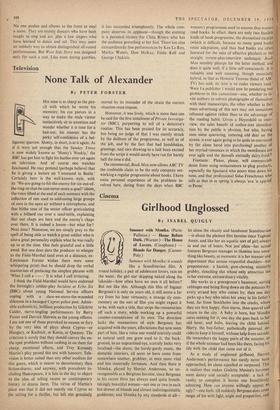Cinema
Girlhood Unglossed
By ISABEL QtIGLY Summer with Monika. (Paris- Pullman.) — Home Before Dark. (Warner.)—The House of Lovers. (Cinephone.) — Blonde for Danger. (Cameo- Poly.) Summer with Monika: it sounds like a Scandinavian film. A truant holiday, a pair of adolescent lovers, rain on the water, the girl star skipping naked along the lakeside—how often have we seen it all before? But not like this. Although this film of Ingmar Bergman's is only six years old, it still seems a far cry from his later virtuosity, a strange sly com- mentary on the sort of film you might expect it to be, with such a title, that strips the romanticism off such a story, while working up a powerful counter-romanticism of its own. The direction lacks the mannerisms of style Bergman has acquired with the years, affectations that now seem part of him, like a voice one would scarcely credit as natural until one grew used to it; the back- ground, to an unpractised eye, scarcely looks very localised—the slums, the hurdy-gurdy music, the domestic interiors, all seem to have come from somewhere souther, grubbier, at once more vital and less materially fortunate. And then there is Monika, played by Harriet Andersson, so un- recognisable as a Bergman heroine, since Bergman in his recent films has always used quite breath- takingly beautiful women—not one or two in each but droves of blonde and almost indistinguishable goddesses; and Monika by any standards at all— let alone the cleanly and handsome Scandinavian —is about the plainest film heroine since Tugboat Annie, and like her an aquatic sort of girl, always in and out of boats. Not just plain—her actual: features Bergman manages to illumine into some- thing like beauty, at moments: it is her manner and deportment that arouse respectful shudders—but preposterous : a loutish, gum-chewing, sinisterlY grubby, slouching slut whose only attraction lies in her extreme, extraordinary vitality.
She works in a greengrocer's basement, sorting cabbages and being flung down on the potatoes by every errand boy who comes by; then one day picks up a boy who takes her away in his father's boat, far from Stockholm into the creeks, where they are first happy, then starve, then quarrel and return to the city. A baby is born, but Monika cares nothing for it; one day she goes back to her, old lover, and bolts, leaving the child behind. Harry, the boy-father, pathetically paternal, de- cides to keep it himself, without help from outside. He remembers the happy parts of the summer, as if the whole summer had been like them, facing his life with the child that came out of it.
As a study of unglossed girlhood, Harriet Andersson's performance has surely never been approached, let alone equalled or surpassed. This, is realism that makes Giuletta Masina's heroines seem dainty and socially acceptable : a lack of vanity so complete it leaves one breathlesslY admiring. How can anyone willingly appear so ugly?—one feels; till suddenly Bergman does some magic of his with light, angle and proportion, and Produces a touching child's head, a sudden move- Ment of beauty. The twitches, the sniffs, the terrible cave-man mat of uncombed hair, the schoolgirl clumsiness, all the loutishness instead of the grace of adolescence, on the one hand; on the other the power and life and animal spirits, an honesty and an animality so complete that one Can no more apply human notions of Lesthetics to them than one could apply them to a kitten or a Pig. Vicious and vulgar Monika may be, but she has a presence, a self-assertiveness, that command some sort of respect : presence and character grow confused, in fact it is hardly more possible to talk of Monika's 'character' than it is possible to talk (except facetiously) about the complexities of be- haviour in, say, a cat or a pig. Only that, being human, she can rise higher or sink lower than the animals, and if she has moments of tenderness and dreams, of rapture and response, she also manages to hate her own child. The scene in the hospital, When the boy comes to visit her after the birth of the baby, should be seen by anyone who thinks he knows anything about adolescents : it struck me as irresistibly true. As indeed every absurd move- ment Monika made struck me as irresistibly true.
Jean Simmons, never, I thought, a very power- ful actress, in Home Before Dark (director :
Mervyn LeRoy; certificate) has a real rip- roaring bosom-beating plum of a part that turns her hair from black to grey to blonde and back to black again and requires her to run through what Is called (rather mysteriously) the gamut of the emotions. And very well she rises to this rather belated Hollywood opportunity. To the sort of role you can imagine Joan Crawford, say, slaughtering with overemphasis she brings a mix- ture of restraint and ardour that makes her credible and sympathetic; through all the extrava- gances of her unbalanced behaviour (she plays an adoring but unloved wife newly out of the mental home where a breakdown put her), you unmistak- ably recognise and take hold of the essential Woman inside it all, not just the uncomplicated girl she was once, but the complex and unhappy creature that circumstances have made her. One feels with her : when she finally turned on her grotesque prig of a husband and said, not angrily, but with an air of cumulative cold dislike, 'You 80 to hell,' the press show audience applauded like Children when the cowboy villain bites the dust. As the study of a marriage, the film is a bit over- simple, elliptical, and obvious; you can hear the grand climaxes clearing their throats before they Plant themselves in position, their regularity and Inevitability coming straight from a teach- Yourself-psychology textbook. But Miss Simmons Persuades; you get her measure as a person, her quality and value. Through all the hysterics, the Changes of personality, even the complete loss of selfhood, she still remains the woman called Charlotte, someone with a past and a future as well as an unhappy present; not an actress called Jean Simmons showing virtuosity.
Julien Duvivier's The House of Lovers ('X' certificate) is a stylish piece after Zola about a womanising draper's assistant (Gerard Philippe) and his women (Dannielle Darrieux, Dany Carrel, Anouk Airnde among them). Blonde for Danger
(director : Marc Allegret; 'A' certificate) has that Spry Mylene Demongeot, picked as a Bardot rival If not successor, in a silly tale about a reform- school girl and a fiic who marries her to keep her Out of further mischief; and doesn't


























 Previous page
Previous page